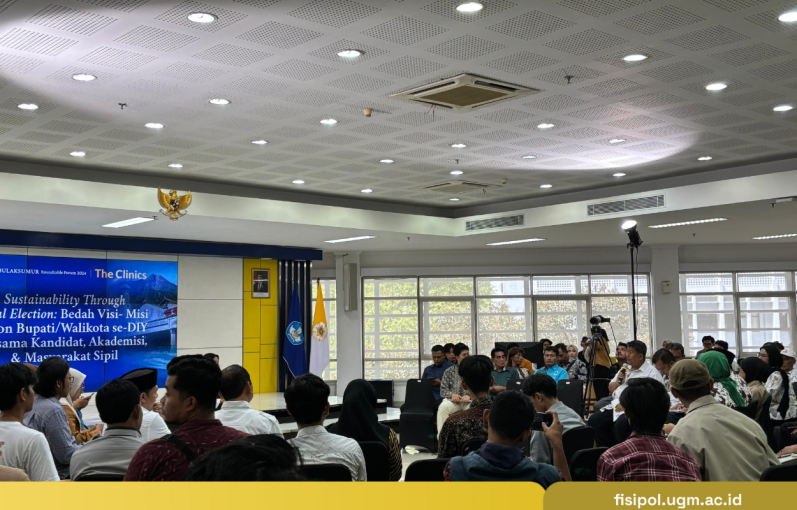
Yogyakarta, 29 October 2024–Bulaksumur Roundtable Forum (BRF) was held again, this time with the theme “Sustainability Through Local Election: Vision-Mission Review of Regent/Mayor Candidates throughout Yogyakarta with Candidates, Academics, & Civil Society”. The two-day BRF The Clinics session on Tuesday (29/10) held at the Auditorium of Fisipol UGM aims to create an egalitarian interactive forum by bringing together regional head candidates in Kulon Progo, academics, and civil society to explore the thoughts of candidates as well as problems in Kulon Progo.
Based on data from LPPD, Kulon Progo Regency still faces many problems, such as the high poverty rate (BPS: 0.402 gini index), low human resources (HDI 75.82 BPS data), the absence of regional spatial regulations and infrastructure, and the complexity of information technology-based public service governance. There are also conflicts between groups.
In response to these problems, Dr. R. Agung Setyawan S.T., M.Sc., MM., emphasised the importance of the Human Development Index. According to him, any development starts with humans as the subject of development, so it is important to standardise formal education followed by spirituality and local culture for the people of Kulon Progo. In addition, he also plans to optimise tourism, MSMEs, agriculture, and regional levies as a solution to poverty alleviation.
Marija, S.T., M.M., M.T., also paid great attention to the quality of human development. According to him, the Kulon Progo community still needs to be more competitive, especially in the labour market, so building a quality community in the future is important. He also emphasised the urgency of increasing PAD and APBD, primarily through tourism and infrastructure improvement.
Novida Kartika Hadhi, S.T., has a big vision to eliminate the dichotomy and disparity of development between the north and south sides of Kulon Progo. She also emphasises the importance of empowering women to participate in development, given Kulon Progo’s predominantly female demographic profile. For this reason, she plans to open investment, especially in the tourism and manufacturing sectors, accompanied by regional economic development through modern agriculture. In her development planning, Novida will emphasise participation from the grassroots, especially the village head’s optimal involvement in development.
Furthermore, in the context of development, investment is one of the effective ways to achieve significant regional development. However, investment also carries risks if left unchecked.
Responding to this, candidate number one believes that investment must pay attention to local culture and must not exclude local communities. “The changes that occur sometimes shock people so that society’s transition from rural to urban must be followed by its culture, not just income from investment,” said Agung.
On the other hand, candidate number two sees regulations and alignment with the community as necessary to accompany that investment. “The investors we need are not machine-intensive investors but investors who can create jobs,” said Marija.
In response to investment, Novida wants to create investment favouring the community through community empowerment. Here, the government is present to form investor-friendly regulations and encourage community empowerment to create harmonious development between investment and local strengths. “Investment-friendly is certainly not only for investors but also for the community,” said Novida.
Suci Lestari Yuana, S.I.P., M.I.A., Lecturer of the Department of International Relations, responded to the exposure of the three candidate pairs. She highlighted the environmental issues that are still unfinished in Yogyakarta, even though environmental issues, especially regarding waste, are a big issue. “Maybe all this time, the waste is only in the back of our heads; it has never become a concrete program; it has only become depoliticised, not a political issue,” said Suci.
Suci also highlighted the ability to utilise and innovate technology in the bureaucracy. According to him, the current bureaucracy has utilized a lot of technology, but it is not yet efficient.
